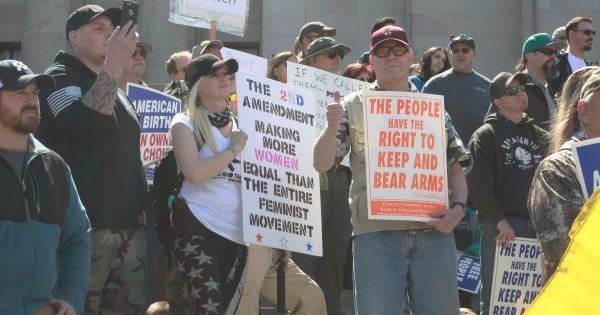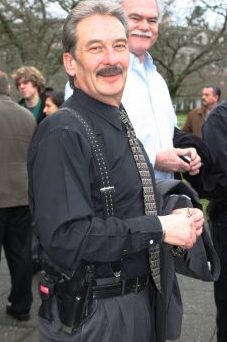
Another legal voice has been added to the growing chorus vowing not to actively enforce provisions of anti-rights Initiative 1639, which passed by slightly less than 60 percent last month, and this time around it’s not a sheriff or police chief, but the prosecuting attorney of Lewis County.
Prosecutor Jonathan Meyer, during a nearly eight-minute interview on KIRO Radio, told host Gee Scott, “The problem with the way 1639 is written is that it’s almost an unenforceable law.”
Meyer explained that the reason is because, in his opinion, the measure violated the state’s single subject rule for citizen initiatives.
“The way that it’s written,” Meyer said, “is very hard to enforce.”
He also told Scott that the initiative does nothing to address “crooks stealing guns.”
This comes on the heels of a report that the Wahkiakum County Sheriff’s office is also not going to actively enforce the gun control initiative, which spanned 30 pages and was initially disqualified by a Thurston County Superior Court judge because the initiative petitions did not comply with requirements of state law. But Judge James Dixon’s ruling was reversed one week later by Washington State’s liberal Supreme Court, which allowed the billionaire-backed initiative on the Nov. 6 ballot.
Sheriff’s departments in Lewis and Ferry County have also said they will not actively enforce the initiative, which raises the legal age to purchase a semiautomatic rifle to 21, requires so-called “enhanced background checks,” adds a $25 paperwork fee to process a semi-auto purchase, requires proof of training, and so-called “secure storage.” It also creates a new felony-level crime of “community endangerment.”
Opponents of the measure, including the Washington State law Enforcement Firearms Instructors Association, likened the training requirement to an unconstitutional “literacy test.”
The law enforcement push was initially started by Republic Police Chief Loren Culp. No law enforcement organization supported the measure, and the five biggest actually came out against it.
The measure is now being challenged in federal district court by the Second Amendment Foundation and National Rifle Association.
Liberals have criticized the lawmen for openly defying the law, but what’s different about that than city governments declaring themselves sanctuaries for illegal immigrants, critics wonder. How can Seattle be so sanctimonious regarding enforcement of a gun control law that may be unconstitutional when the Seattle City Council advocates for a “safe injection site” for drug addicts, rights activists have been observing on social media.
One other thing Meyer mentioned that he acknowledged would be controversial is that he believes firearms education “should be taught in schools.”
In Memoriam
The Evergreen State last Friday lost one of its most devoted and activist open carry advocates with the passing of Jim Beal.

As word spread across social media over the weekend, friends and admirers remembered Beal as a staunch Second Amendment defender, a voice of common sense in a movement to normalize open carry, which can be a lightning rod subject. He had appeared in Olympia during legislative hearings, openly carrying a sidearm.
A Vietnam veteran, Beal had suffered from heart problems for several years, yet he did not allow that to deter his activism, nor his devotion to family and friends.
Beal, while living in an apartment complex south of Seattle-Tacoma International Airport, held Open Carry gatherings that featured barbecues and prizes.
He was also an artist, with a good eye for detail.
Beal is being remembered by many as “my good friend.” In the firearms community, that still stands for something.